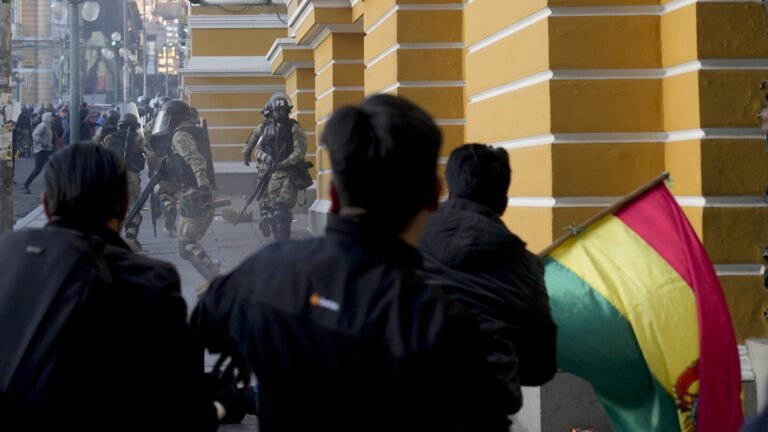LA PAZ, Bolivia (AP) — An armored vehicle rammed into the doors of Bolivia’s government building on Wednesday in an apparent coup attempt, but President Luis Arce vowed to stand firm, appointed new military commanders and ordered the army to withdraw.
Soldiers retreated behind a line of military vehicles as hundreds of President Arce’s supporters poured into the square outside the palace, waving Bolivian flags and cheering.
Surrounded by his ministers, President Arce waved to the crowd as they sang the national anthem. “I thank the Bolivian people,” he said. “Let democracy live on.”
Hours later, Juan Jose Zuniga, the Bolivian general believed to be behind the putsch, was arrested after the attorney general launched an investigation. Charges against him were not immediately clear.
Bolivian President Luis Arce said the country was facing an attempted coup and spoke out firmly, calling on people to mobilize, but armored vehicles slammed into the doors of Bolivia’s government building on Wednesday.
But shortly before his arrest, Zúñiga claimed that President Arce had asked him to storm the palace as a political move. “The president told me: ‘The situation is very bad, very critical. I need to prepare something to increase my popularity,'” Zúñiga told reporters.
Zuniga said he asked Arce if they should remove the armored vehicles, to which Arce replied, “Remove them.”
Wednesday’s violence came after months of tension as economic hardship and protests intensified and two political titans, President Arce and his one-time ally, former leftist President Evo Morales, fought for control of the ruling party.
Yet this apparent attempt to unseat the sitting president appears to lack any meaningful support, with even President Arce’s rivals united in defending democracy and rejecting the uprising.
Military police gather outside the main entrance as an armored vehicle crashes into the doors of the presidential palace in Plaza Murillo in La Paz, Bolivia, Wednesday, June 26, 2024. (Photo by AP/Juan Calita)
The scenes infuriated regional leaders and shocked Bolivia, a country accustomed to political unrest that led to the ouster of President Morales in 2019 following an earlier political crisis.
Military vehicles rolled into the square as the crisis unfolded on Wednesday. Before entering the government building, army commander Zuniga told reporters: “A new cabinet will be formed soon. Our country, our country cannot continue like this.” But Zuniga said he recognized Arce as commander in chief “for now.”
President Zúñiga did not explicitly say he was leading a coup, but inside the palace he said the military was trying to “restore democracy and release political prisoners.”
Shortly after, Arce confronted Zuniga in a palace corridor, according to footage broadcast on Bolivian television. “I am your commander. I order you to withdraw your soldiers. We will not tolerate this insubordination,” Arce said.
Flanked by his ministers, he added: “We will remain firm in Casa Grande and will fight any coup attempts. We need the unity of the Bolivian people.”
Bolivian President Luis Arce pumps his fist as he is surrounded by supporters and reporters outside the government palace in La Paz, Bolivia, Wednesday, June 26, 2024. (Photo by The Associated Press/Juan Calita)
“We will not tolerate another coup attempt to take the lives of Bolivian people,” the president added in a video message.
Less than an hour later, President Arce announced new heads of the army, navy and air force to cheers from his supporters, and thanked the police and regional allies for backing him. He said soldiers who rebelled against him were “disgracing the uniform” of the military.
“I am ordering all those who have been mobilized to return to their units,” said José Wilson Sanchez, the newly appointed Army commander. “We do not want to see what we see on the streets.”
Soon after, armored vehicles roared out of the square, followed by hundreds of military fighters as police in riot gear set up a cordon outside the government palace.
The incident drew outrage from other regional leaders, including the Organization of American States, Chilean President Gabriel Boric, the leader of Honduras and a former leader of Bolivia.
Bolivia, a country of 12 million people, has seen intensifying protests in recent months over a steep economic decline that has turned the country from one of the continent’s fastest-growing countries two decades ago into one of its most vulnerable.
The country is also witnessing visible rifts at the highest levels of the ruling party, with Arce and his one-time ally Morales fighting over the future of the splintering Bolivian Socialist Movement (MAS), known by its Spanish acronym, ahead of 2025 elections.
Following Wednesday’s unrest, local media reports said Bolivians were stockpiling food and other necessities in supermarkets, worried about what might come next.
But speaking to supporters outside the presidential palace, Vice President David Choquehuanca vowed that “Bolivian people will never again allow a coup to be plotted.”
——
Janetsky reported from Mexico City.
——
Janetsky reported from Mexico City.

